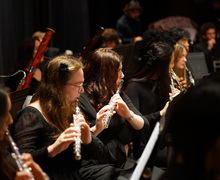In sharing how we mourn, we can better process loss
Nora Benko | Illustration Editor
Our columnist reflects on grief and shares how Middle Eastern traditions can help share and process loss.
To support student journalism and the content you love, become a member of The Daily Orange today.
Birth and death are our universal bookends, with only the journey in between separating us. After many years, our distinctions lose significance.
Personally, I consider myself fortunate to have religion’s guidance, offering a well-crafted roadmap through the grieving process. As I mourned a personal loss over a month, I pondered how other cultures cope with grief beyond my own.
The Middle Eastern grieving process, influenced by various religions and regions, provides valuable insights for those adrift in sorrow. It stands as an additional resource to support individuals during this challenging time.
An important overlap exists between the two predominant Middle Eastern religions — Judaism and Islam. They share strict rules regarding the early stages of the mourning process, in the first week specifically, that ensure both denial and grief can be arrested. Both religions bury quickly — within 24 hours is best — and have time for guests to keep the mourners comfortable in their home.
These are the two most important concepts of mourning, which helped me the most throughout the process. It has to do with the quick burial, which helps the shock subside quickly when seeing the person at rest. The visitation of guests is not to keep the mourners minds busy nor is it to chat over a cup of coffee. Instead, it’s purely a necessity for the mourners to make sure they eat, get out of bed and just take care of themselves.
This is the time where the denial subsides. For several days, your mind is filled with the thoughts of your loved one, and you are constantly reminded by others that they are gone; you are first experiencing the world without them.
After this week, the fog begins to lift more as you begin to return to normal life and start to distract yourself again. But it is important to not distract yourself too much, because forgetting and compressing the situation too heavily can lead to its reemergence.
The brevity, simplicity and the unbearable first week process that these religions have in common allow for the dampening of the formidable denial and grief.
Our unpreparedness for death is quite shocking. If we really understand its existence, how can it be so difficult to deal with it when it approaches ourselves or more importantly, or when it approaches our loved ones?
By attempting to mitigate the waves of denial, these mourning practices become effective in offering comfort and vision to see an enticing path forward in life without this person. The overpopularized “five stages of grieving” have, in a sense, been reevaluated. They are found to sometimes occur out of sequence, with not all emotions experienced. Yet, the core of denial is vital.
The insuppressible state of grieving arises as soon as the unnerving shock regresses. It is such a strange biological response to something which we do not fully understand. For in those very first moments, the news of a passing sounds like gibberish.
The most common phrase said after beginning to digest the news is, “I do not know what to do.” A complete and utter state of shock is what that is.
Comprehending what it means to both live and die remains an enigma. The timeless question of what truly defines a person as “deceased” has lingered in our thoughts for millennia. The question’s inherent subjectivity makes it difficult to answer. A religious person may say it is when someone has lost their soul, but a doctor may say it’s when a heart stops. It is this very subjectiveness that causes denial to be the most consequential step in the grieving process.
It is hard to completely let go when you have dedicated so much time and created so many memories with this person. The only thing that makes life what it is, is the uniqueness of the human perception and judgment. But if this uniqueness is what defines the human experience, then it is incorrect to say a person gone is no longer with us.
For every millisecond we are alive, we are experiencing life through the lens that they molded for us. By this definition, we are here just as much as they remain. This is what defines the denial over the
fact that this person is gone.
Take from religion what you will, but there is something which many of us rely on as fact: when a living creature dies, their heat and energy are dispersed out unto the universe, essentially. This heat and energy is consumed and this consumption is then dispersed again.
Hence, your departed loved one is in the sonic waves of the robin’s chirp, in the warm fire which provides you sanctity through the coldest winters and in the gentle breeze which cools you down in the scorching summertime.
They have never really gone anywhere; they are right there with you, all of the time.
Max Lancer is a sophomore Chemistry major. His column appears bi-weekly. He can be reached at mlancer@syr.edu.
Published on September 24, 2023 at 11:33 pm






